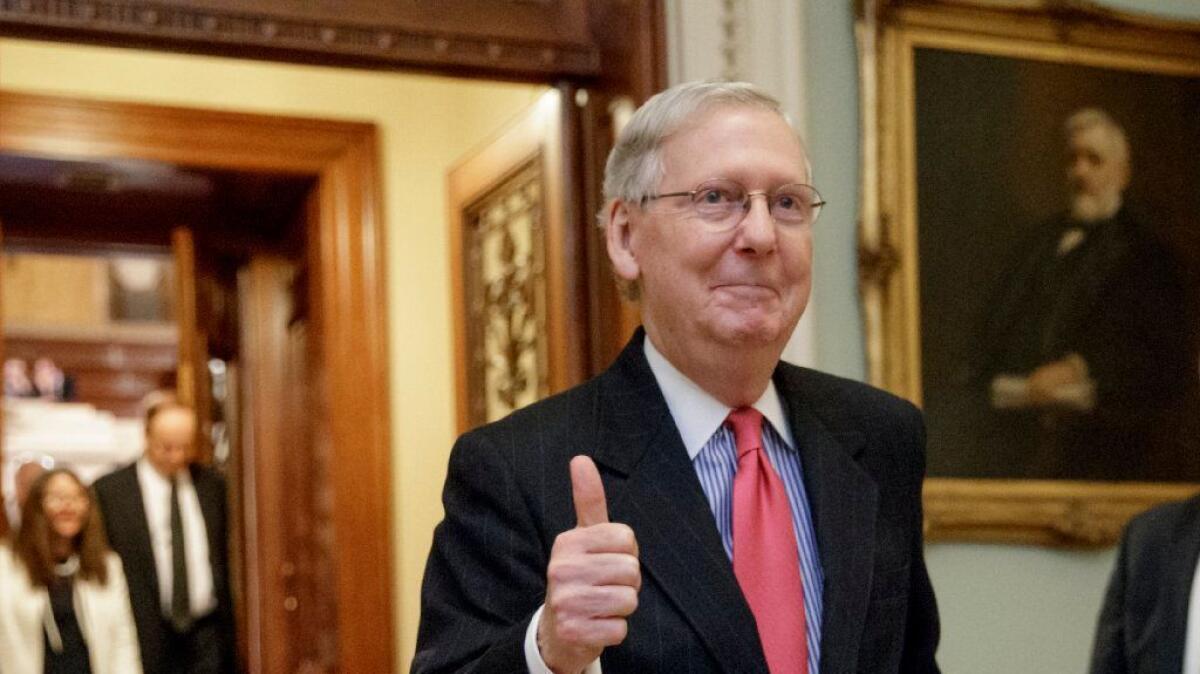Column: Reagan was right: Senate healthcare bill proves government is the problem

Ronald Reagan famously declared that government isn’t the solution, it’s the problem.
On Monday, the nonpartisan Congressional Budget Office concluded that, as far as Reagan’s own party is concerned, the former president had a point.
The CBO released its analysis of Republican senators’ secretly drafted bill aimed at repealing the Affordable Care Act and installing in its place a healthcare system that strips millions of Americans of coverage, raises premiums for many and significantly scales back quality of coverage.
It’s a proposal so aggressively unfriendly to the American people that even President Trump, despite his nearsighted eagerness to sign an Obamacare-repeal bill into law, has branded the Senate legislation’s near-identical House counterpart “mean.”
The CBO said the Senate bill would increase the number of people without insurance by up to 22 million over a decade — a marginal improvement over the House version’s 23 million uninsured.
It would save $321 billion over the same period, but mostly because of less spending on Medicaid, which covers about a fifth of all Americans, mostly kids, the disabled and low-income people. Those savings in turn would go mainly to tax cuts for rich people and medical companies.
Rod Hochman, chief executive of Providence St. Joseph Health System, oversees 50 hospitals and 829 clinics across seven western states, and sits on the board of the American Hospital Assn. He told me after the CBO report was released that what the Republicans are cooking up is “a disaster for healthcare.”
“The Senate and House proposals essentially dismantle Medicaid,” he said.
Polls show that a majority of voters — Republican and Democrat — dislikes the Republicans’ approach to healthcare reform. Yet because the party wedded itself politically to repealing Obamacare, it has no choice but to keep plodding forward.
“We’re going to keep our promise to the American people,” Senate Majority Leader Mitch McConnell has announced.
This, of course, is like promising to give all good little boys and girls a pony, regardless of the cost or foolishness of such an idea. At some point, cooler heads need to prevail.
Those cooler heads are nowhere to be found among Republican lawmakers and a president who has never before held elected office.
In fact, conservatives realize that the only way they’ll even have a chance at passing this rancid porridge of bad ideas is to deny genuine healthcare experts any input and do as much business as possible behind closed doors.
“It’s a tax proposal,” Hochman said. “That’s why they didn’t want to hear from us. Why talk to healthcare people?”
The CBO estimates spending on Medicaid would drop by 26% over a decade under the Senate bill. It anticipates a 30% decline in premiums by 2020, but only because people would be shifting to higher-deductible plans that come with more out-of-pocket costs. Those plans also would be cheaper because they’d provide less coverage.
In a TV interview, presidential advisor Kellyanne Conway insisted Sunday that the only thing preventing low-income Medicaid beneficiaries from getting more comprehensive coverage is their unwillingness to go out and get a proper job.
“If they’re able-bodied and they want to work, then they’ll have employer-sponsored benefits like you and I do,” she said.
The arrogance of that statement is breathtaking.
Sandra R. Hernández, president of the California Health Care Foundation, said the state’s version of Medicaid, Medi-Cal, covers about a third of California residents.
What would happen under the Republican plan, she said, is that “more Californians will likely delay or defer necessary care, and when they show up at clinics and emergency rooms, they will likely be sicker and costlier to treat.”
She described the GOP’s proposed changes as “a Darwinian arena where the rich and strong flourish by stripping away healthcare coverage for low-income Americans.”
Healthcare “Hunger Games,” in other words.
All other developed nations guarantee healthcare to their citizens through variations of Medicare-for-all insurance systems. They provide people with treatment for roughly half the cost of what Americans pay, resulting in better outcomes (longer lifespans, lower infant mortality).
The Republicans’ message to the American people: Get a job, you pathetic deadbeats.
I’ve found that most people who’ve had a major illness come away from the experience with a transformed view of the U.S. healthcare system. On the one hand, there’s a deep appreciation for this country’s quality of care, which is second to none if you can afford it.
At the same time, there’s an awareness that our primarily for-profit system places so many barriers in the path of affordable treatment that it seems deliberately designed to exclude as many people as possible.
McConnell, the architect of the Senate’s healthcare bill, should know better. He was struck with polio at the age of 2. Perhaps the only reason he can walk today is because he received extensive treatment as a child, thanks in large part to the generosity of a nonprofit foundation because his family couldn’t afford the physical-therapy bills.
It’s hard for me to grasp how McConnell could now be so cold-hearted as to reshape the healthcare system so it becomes even less accessible to people with chronic diseases and pre-existing medical conditions, raising out-of-pocket expenses and permitting insurers to offer skimpier plans.
The CBO analysis concludes that higher deductibles and lower financial assistance would result in about 15 million more people being uninsured by next year alone. “Few low-income people would purchase any plan,” it said.
The American Medical Assn. pulled no punches in its assessment Monday of the Senate bill. It said in a letter to McConnell that Republican lawmakers have taken the medical dictum of “first, do no harm” and thrown it out a window.
“We believe that Congress should be working to increase the number of Americans with access to quality, affordable health insurance instead of pursuing policies that have the opposite effect,” the organization said.
Reminds me of a similar sentiment: “I have always felt that medical care should be available to those who cannot otherwise afford it.”
Ronald Reagan said that.
David Lazarus’ column runs Tuesdays and Fridays. He also can be seen daily on KTLA-TV Channel 5 and followed on Twitter @Davidlaz. Send your tips or feedback to david.lazarus@latimes.com.
More to Read
Sign up for Essential California
The most important California stories and recommendations in your inbox every morning.
You may occasionally receive promotional content from the Los Angeles Times.











